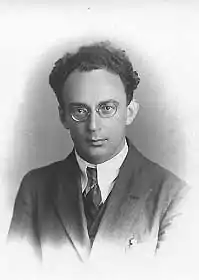Jules Humbert-Droz
Jules Frederic Humbert-Droz (1891, in La Chaux-de-Fonds – 1971) was a Swiss Communist and a founding member of the Communist Party of Switzerland. He held high Comintern office through the 1920s and also acted as Comintern emissary to several west European countries, and was involved in the Right Opposition in 1928. Prior to becoming a Communist, Humbert-Droz was a pastor.[1] He became a social democrat in the 1940s and served as general secretary of the Social Democratic Party of Switzerland from 1946 to 1965.

Early life
Born in a family of watchmakers with socialist beliefs, he started having more and more involvement in the leftist movement. After studying Protestant theology in Neuchâtel, Paris and Berlin he wrote a thesis about 'Socialism and christianism'. He became a pastor in 1914, and started writing in the socialist newspaper La Sentinelle soon after.[2] Married Eugénie Perret in 1916, which would accompany him in his political life with the name Jenny Humbert-Droz.[3]
Political Life
He opposed World War One and refused to serve in the Swiss army, and because of that he was imprisoned.[4] In 1918 he received another sentence for his participation in a general-strike.[2] He supported the Bolshevik revolution, and later in 1921 at the third International Congress of the Comintern, Jules Humbert-Droz was elected, on the proposal of Lenin himself, to secretary of the Communist International.[2] He became after 1920 an outstanding leader in the international communist movement, travelling all around the world to organize the national sections of the Comitern. He exerted some control over the French Communist party and called himself 'the eye of moscow in Paris'. He eventually became the first director of the Latin Secretariat of the Comintern.[5] He was an ally and friend of Nikolai Bukharin. After the Sixth Comintern Congress, Bukharin was politically isolated and only few people in the Moscow Apparatus stayed loyal to him, including Humbert-Droz,[6] who was disgraced along with his ally.[5] Their friendship later ended. He stated in his 1971 memóirs, that the reason for that was because in his last encounter with Bukharin in 1929, Bukharin said he had entered in contact with Zinoviev and Kamenev in order to remove Stalin from leadership, and were planning to use individual terror (assassination) against him. Humbert-Droz disagreed with this, because he thought this terror would destroy the bolshevik leadership, and both knew well the crimes Stalin was capable of.[7][8] He managed to re-enter the Executive Committee of the Communist International after self-criticizing and capitulating. But in 1943 he was definitely expelled from Swiss communist party.[4] Aware of his worth and his experience, the Swiss Socialist Party invited him to return to his original party. Droz was in the central secretariat until 1959, he then retired to La Chaux-de-Fonds, but still remained politically active. He militated against the atomic armament of Switzerland, and contributed to various journals. In the end of his life he undertakes the writing of his memoirs, published between 1969 and 1973.[9]
Books
L’œil de Moscou à Paris, 1922-1924
L'origine de l'Internationale communiste de Zimmerwald à Moscou
Mon Evolution Du Tolstoisme Au Communisme: 1891-1921
De Lenine à Staline. Dix ans au service de l'Internationale communiste 1921-1931
Dix Ans de Lutte Antifasciste, 1931-1941
Le couronnement d'une vie de combat, 1941-1971
References
- "Nachts kamen Stalins Häscher" Der Spiegel (October 16, 1978), p. 100. Note: The HTML file is an OCR scan of a bad photocopy and is full of typos. There is a link at the URL to a PDF version, but it's not much easier to read. Retrieved November 15, 2011 (in German)
- "Death of Jules Humbert-Droz, former secretary of the Communist International". Le Monde.fr (in French). 1971-10-19. Retrieved 2020-08-05.
- "Jules Humbert-Droz". rts.ch (in French). 1971-02-16. Retrieved 2020-08-05.
- Caballero, Manuel. "Latin America and the Comintern, 1919–1943 page 158". Cambridge Core. Retrieved 2020-08-05.
- McDermott, Kevin; Agnew, Jeremy (1996). The Comintern. History of international Communism from Lenin to Stalin. London: MacMillan. pp. 85–86. ISBN 0-333-55284-9.
- Cohen, Stephen F. (1980). Bukharin and the Bolshevik Revolution: A Political Biography, 1888-1938. Oxford University Press. ISBN 978-0-19-502697-9.
- ""Une charogne", ou les destins croisés de Boukharine et Humbert-Droz". Le Temps (in French). 2017-07-06. ISSN 1423-3967. Retrieved 2020-08-05.
- Humbert-Droz, Jules; Humbert-Droz, Jules (1971). De Lenine a Staline: dix ans au service de l'Internationale communiste, 1921-1931. Memoires de Jules Humbert-Droz. Neuchatel: Baconniere.
- "Ville de La Chaux-de-Fonds". cdf-bibliotheques.ne.ch. Retrieved 2020-09-28.